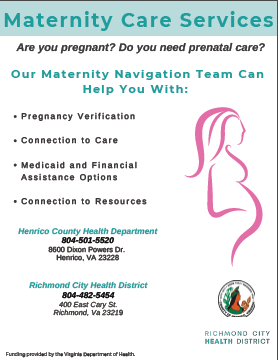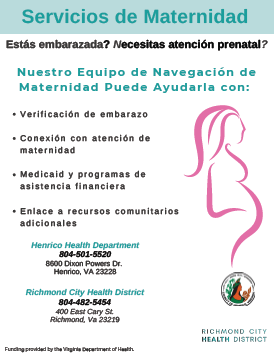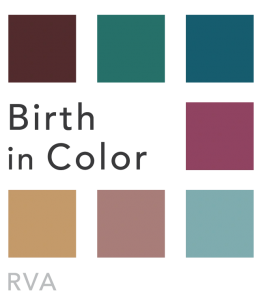Healthy Childbirth and Infancy
If you are pregnant, no matter your insurance status, contact us for more information about your maternal healthcare options. Learn more about our Henrico Maternal Navigation services below.
For healthy pregnancy and healthy baby information visit http://womenshealth.gov/pregnancy.
If you need assistance in quitting smoking, call QuitNow Virginia at 1-800-QUIT-NOW (1-800-784-8669).
Every mom and dad wants a healthy baby.
We want that for you, too. You can cut your risk of premature birth and complications by taking care of your baby before it’s born. It’s a proven fact that many birth complications can be prevented with early and continued prenatal care. When you learn that you are pregnant, make sure that you:
• See a doctor or healthcare provider within the first three months of pregnancy
• Keep your appointments
• Eat properly by eating nutritious foods
• Don’t smoke or drink alcohol
• Avoid stress and activities that could result in physical injury
• Learn the warning signs of preterm labor
CONTACT INFORMATION
Henrico Health Dept.
West Clinic
8600 Dixon Powers Dr.
Henrico, VA 23228
Henrico Health Dept.
East Clinic
1400 N. Laburnum Ave.
Richmond, VA 23223
Open Monday-Friday
8:00 AM – 5:00 PM
Maternity Navigation

CALL NOW!
Henrico County Health Department
804-501-5520
Richmond City Health District
804-482-5454
Richmond and Henrico Health Districts are here to help new moms connect to prenatal care. If you are pregnant and not sure what to do next please contact us! Our bilingual (English/Spanish)social workers provide maternity case management focused on early access to prenatal care.
We specialize in connecting uninsured pregnant women to:
- Prenatal care
- Pregnancy education
- Pregnancy tests (Henrico only)
- Healthcare coverage assistance
- Financial assistance options
- Connection to community resources.
Coming Soon
- Medicaid Application assistance
- Richmond pregnancy testing
- RN case management
Navegación de maternidad

¡LLAME AHORA!
Henrico Departamento de Salud
804-501-5520
Richmond Distrito de Salud
804-482-5454
Los distritos de salud de Richmond y Henrico pueden ayudar a las nuevas madres a conectarse con la atención prenatal. Si está embarazada y necesita ayuda, ¡contáctenos! Nuestros trabajadores sociales bilingües (inglés / español) lideran la gestión de casos de maternidad centrada en el acceso temprano a la atención prenatal.
Nos especializamos en conectar a mujeres embarazadas sin seguro médico con:
- Atención prenatal
- Educación sobre el embarazo
- Pruebas de embarazo (solo Henrico)
- Asistencia con seguro médico
- Opciones de asistencia financiera
- Conexión a los recursos comunitarios.
Próximamente
- Asistencia con la solicitud de Medicaid
- Pruebas de embarazo (Richmond)
- Manejo de casos por enfermeras registradas
Introducing: Community-Based Doula Program
Are you a pregnant person who identifies as black or African-American*? You might be eligible to receive FREE support services from a community-based doula.
The Richmond City/Henrico County Health Departments are now offering a community-based doula program for black-identifying pregnant people in Henrico County. A community-based doula is a trained labor support person who comes from the same culture and background as the person giving birth. As trusted community members, community-based doulas perform home visits, help connect persons giving birth to local social services, and providing a holistic approach focusing on prenatal and postnatal health.
How does the program work?
If you qualify and are accepted into this program, you will receive free Doula care through Birth in Color RVA, a local organization of well-trained, community-based doulas, dedicated to improving maternal and child health in the Greater Richmond area.
To apply for the Doula Program, you can:
- Complete the screening and start the intake process through this link. (Completion of this form does not guarantee acceptance into the program. After completing the intake form, you may be contacted with further information.)
OR - Contact our partner doula organization, Birth in Color, for more information and assistance. Be sure to mention the Henrico Health Department’s Free Doula Program.
- Midwives are health care practitioners who provide the person giving birth with the necessary medical support, care and advice during pregnancy, labor and the postpartum period. Doulas are trained to provide evidence-based information, emotional and physical non-medical support before, during, and after labor.
- Both a midwife and a doula can be used on your birth team.
- A community-based doula is a trained labor support person who comes from the same culture and background as the person giving birth. As trusted community members, community-based doulas can perform home visits, help connect persons giving birth to local social services, and provide a holistic approach focusing on prenatal and postnatal health.
- Community-based doulas of color can help a person giving birth navigate structural racism in healthcare.
- Improved maternal and infant health
- In studies, Doulas have been associated with: more spontaneous vaginal births, higher satisfaction with the birth experience, increased breastfeeding initiation, and shorter labor.
- Doulas have also been shown to lessen the chance of low birth weight and infant/maternal mortality.
- On average, people who use doula services have fewer c-sections and require less use of pain medication during delivery.
- Increased satisfaction and engagement with maternity care
- Decrease in health disparities and lesser effect of stressors (from racial discrimination, food insecurity, poverty, etc.) on the birth process
- Decreased healthcare spending (because Doulas can reduce the number of c-sections, repeat c-sections, epidurals, birth complications, and chronic conditions, they can decrease the cost of maternity care for both private insurance and Medicaid)
- Clients in this program will receive services free of charge.
- Doulas will be paid by a grant received by the Richmond and Henrico Health Departments.
- The US has one of the highest rates of maternal death compared to other developed countries.
- Black persons giving birth in the US have maternal death rates more than double that of white persons giving birth, regardless of socioeconomic status.
- Black, immigrant, low-income, under-insured/uninsured, and Medicaid-recipient people giving birth are at the highest risk for poor birth outcomes and face the most barriers to getting doula care.
- People who identify as black/African American/Afro-Latinx, live in Henrico County, plan to give birth in the Greater Richmond Area, and are low-income (qualify for WIC).
- Doulas can provide physical and emotional support to all different types of births, and are there to help the person giving birth and support their birth plan.
- Doulas do not take the place of a supportive partner. Rather, they are there during the delivery to support both the person giving birth and their partner/family, as well as before and after birth.
- This program allows for virtual doula visits if necessary due to Covid-19 precautions.
- Doulas will have up to 8 prenatal/postpartum visits with each client.
- Home visiting programs provide education and guidance to families and their children to help promote healthy parent-child attachment starting from pregnancy throughout a child’s early years. Community-based doulas are focused on providing information, advocacy, and support for the birthing person before, during, and just shortly after birth. Both home-visiting and doulas can work together to help the person giving birth have the best possible outcome.
Greater Richmond Regional Maternal Child Health Collective Impact Taskforce
Mission
Improve maternal and infant health outcomes and eliminate disparities through collaborative action as members of the Greater Richmond Regional Maternal Child Health Taskforce.
History
In summer 2019, the Richmond City Health Department, with mayoral support, convened a group of community members, nonprofit organizations, legislative representatives, and health and social service providers in the City of Richmond to address racial disparities in maternal health outcomes. In response to this request, these individuals and entities organized to form a collective impact group, the Greater Richmond Regional Maternal Child Health Taskforce, which has been meeting since June 2019.
What is Collective Impact?
Collective impact is a way for many collaborators and stakeholders to work together efficiently and effectively to address complex problems, bring people together, and achieve social change.
A collective impact task force is made of participants who have shared goals and a commitment to achieving positive change. Participants track progress with shared measures, build trust with continuous communication, and engage in mutually reinforcing activities to support and learn from each other, while also maximizing their end result. Finally, a collect impact taskforce benefits from “backbone support” which can be a single organization or many actors that provide administrative and financial support to ensure the initiative stays focused and moves forward.
Steering Committee Members
Amy Popovich, RN MSN
Nurse Manager
Virginia Department of Health
Richmond and Henrico Health Districts
Emily Schreer
Public Health Associate, Maternal Child Health
Virginia Department of Health
Richmond City Health District
Kenda Sutton-EL, CLC, Student Midwife, Certified Full Spectrum Doula
Executive Director & Co-Founder
Birth in Color RVA
LaWanda Dunn BSN, RN/PHN
Supervisor
Virginia Department of Health
Richmond City Health District
Leslie Lytle
Founder & Executive Director
Nurture RVA
Nikiya Ellis
Cofounder, Co-Director & Certified Full Spectrum Doula
Birth in Color RVA
Osita Iroegbu
Senior Policy Advisor
Community Engagement, Inclusion and Equity
Office of Mayor Levar M. Stoney
Phyllis Bradley, MSW, MA, ECD, EDS, QMHP-A, QMRP-C
Director, Early Childhood Development
Urban Baby Beginnings
Whitney E. Tidwell, MPH, BSN, RN
Public Health Nurse, Maternal Child Health
Virginia Department of Health
Richmond City Health District
Work Group Goals and Leads
Doula Workgroup
- Goal: To establish training and certification guidelines for doulas; determine the minimum qualifications/core competencies; set doula fund eligibility requirements.
- Leads: Phyllis Bradley and Nikiya Ellis
Family Planning Workgroup
- Goal: To increase access to family planning services; Increase the number of women enrolled in Medicaid; Promote whole woman wellness models and cultural humility training for providers.
Integrated Care Workgroup:
- Goal: Create an integrated care model considering potential costs, positions needed, and resources needed (funding sources, policy changes); create an online platform for resources and information to support access to care and information about family planning options.
- Leads: Leslie Lytle and Kenda Sutton-EL
External Resources





